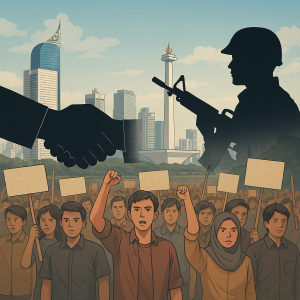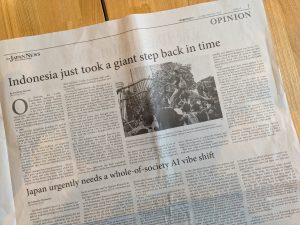USAの不穏な動向!? 民主主義とグローバリゼーションの転換点? インドネシア民主主義の行方に注目!
 イメージ
イメージ
USAの不穏な動向!?民主主義とグローバリゼーションの転換点?
インドネシア民主主義の行方に注目!
最近の国際情勢を見ると、世界は大きな転換点に差しかかっているように感じます。
アメリカではトランプ前大統領が復活の兆しを見せ、
かつて発動した相互関税政策によって世界経済が混乱した記憶も新しいです。
お隣の韓国では大統領の罷免があり、アジア各国の政治が不安定さを増す中、
ある英字新聞のコラムが目に留まりました。
その見出しは「インドネシアの民主主義が大きく後退するのではないか」
というものでした。
個人的にとても気になり、読み進めてみると、
インドネシアにおける近年の法改正と政治の動きが、
民主主義に対する重大な転換点となりうることが伝えられていました。

軍の影響力が急拡大?スハルト時代の再来か
記事によれば、インドネシア下院は2024年に国軍法の改正案を全会一致で可決し、
軍の公的役割を大幅に拡大しました。
この法改正により、現役の軍人が政府の主要ポストを兼任できるようになったのです。
これは1998年にスハルト元大統領の軍事独裁政権が崩壊して以降、
長い年月をかけて進められてきた民主化の成果を後退させる動きとして、
国内外で大きな懸念を呼んでいます。
2025年3月には、さらに軍人が司法機関やその他の政府機関でも
役職に就くことを許可する法律が可決され、
人権団体や民主化活動家からは「スハルト時代の軍事的権威主義を彷彿とさせる」
との批判が高まっています。
一方で選挙制度には前向きな改革も
ただし、暗いニュースばかりではありません。
同年2月にはインドネシアの憲法裁判所が、大統領候補の指名に
必要な議会の議席割合に関する「閾値」を撤廃する決定を下しました。
これにより、小規模政党からも大統領候補を擁立できる可能性が広がり、
選挙プロセスの開放性が増すと期待されています。
このように、インドネシアでは一方で民主主義の根幹を揺るがすような動きがある一方で、
制度面では改革も同時に進んでおり、その行方には注目が必要です。
若者たちの声が社会を動かす
現地では若者たちがこうした変化に敏感に反応しています。
2025年2月、首都ジャカルタや文化都市ジョグジャカルタなどでは
大規模な抗議デモが発生しました。学生たちは「教育を犠牲にするな」
「インフラ整備を優先せよ」といったスローガンを掲げ、
政府に対する不満を力強く表明しました。
彼らの行動は、インドネシアの民主主義に対する市民の意識が
高まっている証でもあります。
特に若い世代が自らの未来のために声を上げる姿勢は、
今後の政治の方向性を大きく左右するかもしれません。
留学生はどう受け止めているのか?
ところで、私の知人であるインドネシアからの留学生に話を聞いたところ、
国内の政治情勢にはあまり関心を示していないようでした。
海外にいると、やはり目の前の生活や学業が優先されるのかもしれません。
とはいえ、彼らにとっても母国の政治は決して無関係ではないはず。
日本にいる私たちも、こうしたアジアの動きにもっと敏感であるべきだと感じます。
 イメージ
イメージ
世界は自国優先主義へ向かうのか?
今回のインドネシアの事例に限らず、世界各地で「自由貿易主義」から
「自国第一主義」へと流れが変わりつつある印象を受けます。
これはグローバリゼーションの行き過ぎへの反動とも言えるかもしれません。
民主主義の後退や国家主義の台頭は、時に世界的な緊張を生む要因にもなり得ます。
願わくば、これが新たな世界大戦の引き金とならないよう、
慎重な歩みが求められる時代に入ったのかもしれません。
(つづく)
 image
image
Troubling Developments in the USA!?
A Turning Point for Democracy and Globalization?
Spotlight on the Future of Indonesian Democracy!
Looking at recent international developments,
it seems the world may be at a major turning point.
In the United States, former President Trump is showing signs of a comeback,
and the memories of global economic turmoil caused by
his reciprocal tariff policies are still fresh.
In neighboring South Korea, the president was impeached,
and amid growing political instability across Asia,
a column in an English-language newspaper caught my eye.
The headline read,
“Is Indonesian Democracy in Serious Decline?”
Personally intrigued, I read further and found that recent legal reforms and
political developments in Indonesia could indeed mark a significant turning point
for the country’s democratic path.

Expanding Military Power? A Return to the Suharto Era?
According to the article,
Indonesia’s House of Representatives unanimously passed
an amendment to the Military Law in 2024,
significantly expanding the public role of the military.
This revision allows active-duty military officers
to simultaneously hold key government posts.
This move is raising significant concern both domestically and internationally,
as it seems to roll back the hard-won democratic progress achieved
since the fall of former President Suharto’s military dictatorship in 1998.
Furthermore, in March 2025, a new law was passed permitting military personnel
to hold positions in the judiciary and other governmental bodies.
Human rights groups and pro-democracy activists are increasingly voicing criticism,
saying this development is reminiscent of Suharto-era authoritarianism.
Progress in Electoral Reform
However, it’s not all bleak news.
In February of the same year,Indonesia’s Constitutional Court abolished
the parliamentary seat threshold required to nominate a presidential candidate.
This reform opens the possibility for smaller parties to field candidates,
potentially increasing the inclusiveness of the electoral process.
Thus, while there are troubling moves that shake the foundations of democracy,
institutional reforms are also underway highlighting the need to carefully observe
the direction Indonesia takes.
The Voices of Youth Driving Social Change
In Indonesia, young people are reacting sensitively to these changes.
In February 2025, large-scale protests broke out in the capital Jakarta and
in cultural centers like Yogyakarta.
Students chanted slogans such as “Don’t Sacrifice Education!” and
“Prioritize Infrastructure!”,
clearly expressing dissatisfaction with the government.
Their activism reflects a growing civic awareness of democratic values in Indonesia.
The willingness of the younger generation to speak out for their future may significantly
influence the political trajectory of the country.
What Do International Students Think?
Incidentally, when I spoke with an Indonesian international student I know,
they didn’t seem particularly interested in the political situation back home.
Perhaps when living abroad, immediate concerns like school and daily life take precedence.
Still, their home country’s politics are not irrelevant to them.
We in Japan, too, should stay more attuned to political shifts in Asia.
 image
image
Is the World Heading Toward Nationalism?
Beyond the case of Indonesia,
it feels like the global trend is shifting from “free trade” toward “national self-interest.
” This could be seen as a backlash against the excesses of globalization.
The retreat of democracy and the rise of nationalism may become sources of global tension.
Hopefully, we are not entering an era where such developments spark another world war.
Now, more than ever, the world needs to tread carefully.
(To be continued)

